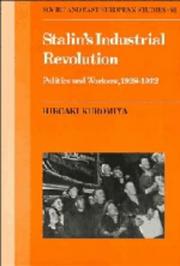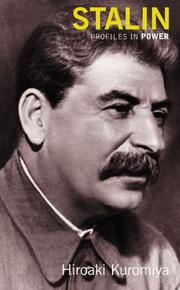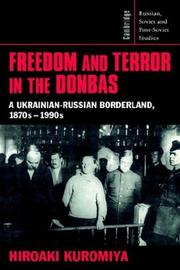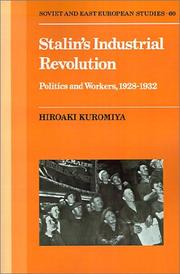| Listing 1 - 10 of 24 | << page >> |
Sort by
|

ISBN: 052135157X Year: 1988 Publisher: Cambridge Cambridge University Press
Abstract | Keywords | Export | Availability | Bookmark
 Loading...
Loading...Choose an application
- Reference Manager
- EndNote
- RefWorks (Direct export to RefWorks)
History of North America --- History of Eastern Europe --- Stalin, Joseph --- anno 1930-1939 --- Central planning --- Working class --- Planification centrale --- Travailleurs --- History --- Histoire --- Stalin, Joseph, --- Soviet Union --- URSS --- Economic policy --- Industries --- Politics and government --- Politique économique --- Industrie --- Politique et gouvernement --- Industrialization --- Politique économique --- History.
Book
ISBN: 1442661070 9781442661073 9781442644618 1442644613 1442661089 Year: 2012 Publisher: Toronto Buffalo University of Toronto Press
Abstract | Keywords | Export | Availability | Bookmark
 Loading...
Loading...Choose an application
- Reference Manager
- EndNote
- RefWorks (Direct export to RefWorks)
"Conscience on Trial reveals the startling story, kept secret for sixty years, of ordinary citizens caught up in the elaborate machinery of political terror in Stalinist Ukraine. In 1952, fourteen poor, barely literate Seventh-Day Adventists living on the margins of Soviet society were clandestinely tried for allegedly advocating pacifism and adhering to the Saturday Sabbath. The only written records of this trial were sealed in the KGB archives in Kiev, and this harrowing episode has until now been unknown even within the Ukraine. Hiroaki Kuromiya has carefully analyzed these newly discovered documents, and in doing so, reveals a fascinating picture of private life and religious belief under the atheist Stalinist regime. Kuromiya convincingly elucidates the mechanism of the Soviet secret police and explores the minds of non-conformist believers -precursors to the revival of dissidence after Stalin's death in 1953"--Publisher's website.
Trials (Political crimes and offenses) --- Pacifists --- Adventists --- Second Adventists --- Millerite movement --- Activists, Peace --- Peace activists --- Persons --- Political crimes and offenses --- History --- Soviet Union --- Politics and government

ISBN: 1317867807 1317867793 131583541X 1281347264 9786611347260 1405898682 9781317867791 0582784794 9780582784796 9781315835419 9781317867784 9781138131583 Year: 2005 Publisher: Harlow Pearson Longman
Abstract | Keywords | Export | Availability | Bookmark
 Loading...
Loading...Choose an application
- Reference Manager
- EndNote
- RefWorks (Direct export to RefWorks)
This profile looks at how Stalin, despite being regarded as intellectually inferior by his rivals, managed to rise to power and rule the largest country in the world, achievieving divine-like status as a dictator.
Through recently uncovered research material and Stalin's archives in Moscow, Kuromiya analyzes how and why Stalin was a rare, even unique, politician who literally lived by politics alone. He analyses how Stalin understood psychology campaigns well and how he used this understanding in his political reign and terror. Kuromiya provides a convincing, concise and up-to-date an
Heads of state --- Stalin, Joseph, --- Djougatchvili, Iossif Vissarionovitch, --- Джугашвили, Иосиф Виссарионович, --- Dzhugashvili, Iosif Vissarionovich, --- Koba, --- Shih-tʻai-lin, --- Sidalin, --- Ssu-ta-lin, --- Stalin, Giuseppe, --- Сталин, И. В. --- Stalin, I. V. --- Сталин, Иосиф, --- Stalin, Iosif, --- Сталин, К., --- Stalin, K., --- Staline, --- Staline, Joseph, --- Staljin, J. V., --- Sutārin, --- Soselo, --- Stalini, Ioseb Besarionis że, --- Sṭalin, Y. Ṿ., --- Sṭalin, Y., --- Stalin, Josef, --- Stalin, Josef Vissarionovich, --- סטאלין, יאסיף, --- סטאלין, י. --- סטאלין, י. וו --- סטאלין, י. װ. --- סטאלין, י., --- סטלין, יוסיף ויסאריונוביץ׳, --- סטלין, יוסף --- 斯大林, --- Stalin, Jossif Vissarionovitš, --- Sztálin, Joszif, --- Istālīn, Yūsīf Vīsāryūnūvīch, --- استالين، يوسيف ويساريونووتج, --- Soviet Union --- History --- Stalin, Joseph

ISBN: 9780521526081 9780521622387 0521622387 0521526086 0465002374 9780465018970 0465018971 9780465002375 Year: 1998 Publisher: Cambridge Cambridge University Press
Abstract | Keywords | Export | Availability | Bookmark
 Loading...
Loading...Choose an application
- Reference Manager
- EndNote
- RefWorks (Direct export to RefWorks)
"This is a book about the steppe frontier land on the border of Ukraine and Russia. A little-known former Cossack land, the Donbas remained a haven for fugitives, providing freedom to whoever needed it. As a result, Stalin's Terror was extraordinarily harsh in the Donbas. Drawing on much new information from formerly closed archives in Ukraine and Russia, the book paints a detailed yet panoramic picture of the tumultuous history of the Donbas and analyzes critical events in modern Ukrainian and Russian history from a regional perspective."
Political persecution --- Political repression --- Repression, Political --- Persecution --- Civil rights --- Donets Basin (Ukraine and Russia) --- Donbas (Ukraine and Russia) --- Donbass (Ukraine and Russia) --- Donets Basin (Ukraine and R.S.F.S.R.) --- History --- Princes --- Habsburg-Lothringen, Wilhelm, --- Habsburg, House of. --- Lothringen, Wilhelm Habsburg-, --- Vyshyvanyĭ, Vasylʹ, --- Vyshyvany, Vasyl, --- Habsburh, Vilʹhelʹm, --- Habsburh, V. --- Вишиваний, Василь, --- Vyshywany, Vasil, --- History of Eastern Europe --- anno 1800-1899 --- anno 1900-1999 --- Russia --- Ukraine --- Habsburh, Vilʹhelʹm fon, --- Габсбург, Вільгельм фон,
Book
ISBN: 1003203353 1000832201 1032066733 1032066768 Year: 2022 Publisher: Abingdon, Oxon ; New York, New York : Routledge,
Abstract | Keywords | Export | Availability | Bookmark
 Loading...
Loading...Choose an application
- Reference Manager
- EndNote
- RefWorks (Direct export to RefWorks)
"Stalin was a master of deception, disinformation, and camouflage, by means of which he gained supremacy over China and defeated imperialism on Chinese soil. This book examines Stalin's covert operations in his hunt for supremacy. By the late 1920s Britain had ceded place to Japan as Stalin's main enemy in Asia. By seducing Japan deeply into China, Stalin successfully turned Japan's aggression into a weapon of its own destruction. The book examines Stalin's covert operations from the murder of the Manchurian warlord Zhang Zuolin in 1928 and the publication of the forged "Tanaka Memorial" in 1929, to Stalin's hidden role in Japan's invasion of Manchuria in 1931, the outbreak of all-out war between China and Japan in 1937, and Japan's defeat in 1945. In the shadow of these and other events we find Stalin and his secret operatives, including many Chinese and Japanese collaborators, most notably Zhang Xueliang and Kōmoto Daisaku, the self-professed assassin of Zhang Zuolin. The book challenges accounts of the turbulent history of inter-war East Asia that have ignored or minimized Stalin's presence and instead exposes and analyzes Stalin's secret modus operandi, modernized as "hybrid war" in today's Russia. The book is essential for students and specialists of Stalin, China, the Soviet Union, Japan, and East Asia"--
Hybrid warfare. --- China --- Foreign relations --- War --- Stalin, Joseph, --- Zhang, Zuolin, --- Assassination. --- Chang, Tso-lin, --- Zhang, Yuting, --- Chang, Yü-tʻing, --- Zhangzuolin, --- Chzhan, T︠S︡zolinʹ, --- Chō, Sakurin, --- 张作霖, --- 張作霖, --- Djougatchvili, Iossif Vissarionovitch, --- Джугашвили, Иосиф Виссарионович, --- Dzhugashvili, Iosif Vissarionovich, --- Koba, --- Shih-tʻai-lin, --- Sidalin, --- Ssu-ta-lin, --- Stalin, Giuseppe, --- Сталин, И. В. --- Stalin, I. V. --- Сталин, Иосиф, --- Stalin, Iosif, --- Сталин, К., --- Stalin, K., --- Staline, --- Staline, Joseph, --- Staljin, J. V., --- Sutārin, --- Soselo, --- Stalini, Ioseb Besarionis że, --- Sṭalin, Y. Ṿ., --- Sṭalin, Y., --- Stalin, Josef, --- Stalin, Josef Vissarionovich, --- סטאלין, יאסיף, --- סטאלין, י. --- סטאלין, י. וו --- סטאלין, י. װ. --- סטאלין, י., --- סטלין, יוסיף ויסאריונוביץ׳, --- סטלין, יוסף --- 斯大林, --- Stalin, Jossif Vissarionovitš, --- Sztálin, Joszif, --- Istālīn, Yūsīf Vīsāryūnūvīch, --- استالين، يوسيف ويساريونووتج, --- Σταλιν, Ιωσηφ, --- Stalin, Ιōsēph, --- Jughashvili, Ioseb, --- Jughashvili, Ioseb Vissarionovich, --- Jughashvili, Koba,

ISBN: 0521387418 9780521387415 052135157X 9780521351577 Year: 1990 Publisher: Cambridge ; New York ; Port Chester ; Melbourne ; Sydney : Cambridge University Press,
Abstract | Keywords | Export | Availability | Bookmark
 Loading...
Loading...Choose an application
- Reference Manager
- EndNote
- RefWorks (Direct export to RefWorks)
Central planning --- Industries --- Working class --- History. --- History --- Stalin, Joseph, --- Soviet Union --- Economic policy --- Politics and government --- Classe ouvrière --- Politique économique --- Politique et gouvernement --- Staline, Joseph,
Book
ISBN: 3110469790 Year: 2016 Publisher: De Gruyter
Abstract | Keywords | Export | Availability | Bookmark
 Loading...
Loading...Choose an application
- Reference Manager
- EndNote
- RefWorks (Direct export to RefWorks)
Book
ISBN: 1000832171 Year: 2023 Publisher: Taylor & Francis
Abstract | Keywords | Export | Availability | Bookmark
 Loading...
Loading...Choose an application
- Reference Manager
- EndNote
- RefWorks (Direct export to RefWorks)
Book
Year: 2023 Publisher: [Place of publication not identified] : Taylor & Francis,
Abstract | Keywords | Export | Availability | Bookmark
 Loading...
Loading...Choose an application
- Reference Manager
- EndNote
- RefWorks (Direct export to RefWorks)
"Stalin was a master of deception, disinformation, and camouflage, by means of which he gained supremacy over China and defeated imperialism on Chinese soil. This book examines Stalin's covert operations in his hunt for supremacy. By the late 1920s Britain had ceded place to Japan as Stalin's main enemy in Asia. By seducing Japan deeply into China, Stalin successfully turned Japan's aggression into a weapon of its own destruction. The book examines Stalin's covert operations from the murder of the Manchurian warlord Zhang Zuolin in 1928 and the publication of the forged "Tanaka Memorial" in 1929, to Stalin's hidden role in Japan's invasion of Manchuria in 1931, the outbreak of all-out war between China and Japan in 1937, and Japan's defeat in 1945. In the shadow of these and other events we find Stalin and his secret operatives, including many Chinese and Japanese collaborators, most notably Zhang Xueliang and Kōmoto Daisaku, the self-professed assassin of Zhang Zuolin. The book challenges accounts of the turbulent history of inter-war East Asia that have ignored or minimized Stalin's presence and instead exposes and analyzes Stalin's secret modus operandi, modernized as "hybrid war" in today's Russia. The book is essential for students and specialists of Stalin, China, the Soviet Union, Japan, and East Asia"
Book
Year: 2023 Publisher: [Place of publication not identified] : Taylor & Francis,
Abstract | Keywords | Export | Availability | Bookmark
 Loading...
Loading...Choose an application
- Reference Manager
- EndNote
- RefWorks (Direct export to RefWorks)
"Stalin was a master of deception, disinformation, and camouflage, by means of which he gained supremacy over China and defeated imperialism on Chinese soil. This book examines Stalin's covert operations in his hunt for supremacy. By the late 1920s Britain had ceded place to Japan as Stalin's main enemy in Asia. By seducing Japan deeply into China, Stalin successfully turned Japan's aggression into a weapon of its own destruction. The book examines Stalin's covert operations from the murder of the Manchurian warlord Zhang Zuolin in 1928 and the publication of the forged "Tanaka Memorial" in 1929, to Stalin's hidden role in Japan's invasion of Manchuria in 1931, the outbreak of all-out war between China and Japan in 1937, and Japan's defeat in 1945. In the shadow of these and other events we find Stalin and his secret operatives, including many Chinese and Japanese collaborators, most notably Zhang Xueliang and Kōmoto Daisaku, the self-professed assassin of Zhang Zuolin. The book challenges accounts of the turbulent history of inter-war East Asia that have ignored or minimized Stalin's presence and instead exposes and analyzes Stalin's secret modus operandi, modernized as "hybrid war" in today's Russia. The book is essential for students and specialists of Stalin, China, the Soviet Union, Japan, and East Asia"
| Listing 1 - 10 of 24 | << page >> |
Sort by
|

 Search
Search Feedback
Feedback About UniCat
About UniCat  Help
Help News
News